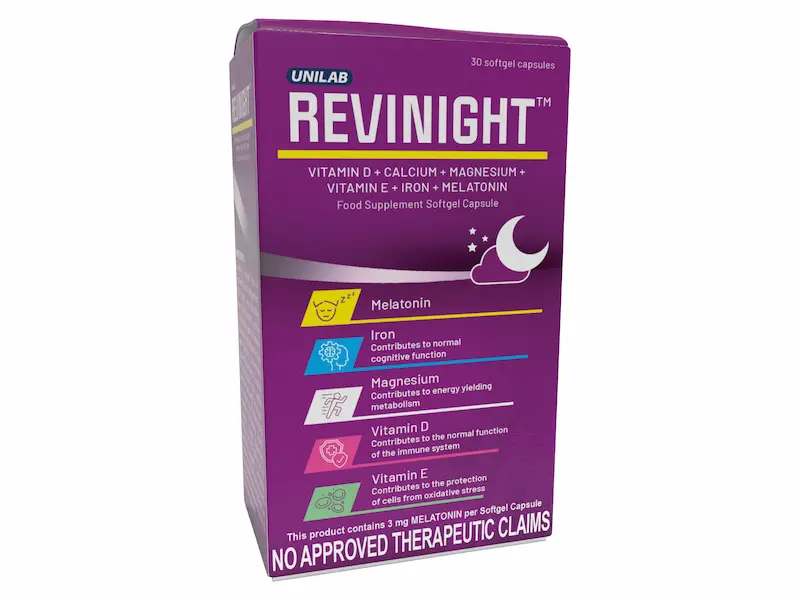“Ano ang epekto ng puyat o kulang sa tulog sa katawan?” This is a question that you have probably thought about many times, especially if you are the type to sacrifice sleep whenever things get busy.
If you think that the effects of sleep deprivation are limited to feeling groggy the next day, then you are mistaken. The reality is that it can quietly chip away at your health without you even noticing.
But how exactly does lack of sleep affect your health? Continue reading to find out.
The connection between healthy sleep and a healthy heart
Did you know that getting enough quality sleep is not just about feeling rested? Your entire body, especially your heart, depends on it. When you sleep, your body goes into repair mode1; blood pressure drops, stress hormones dip, and your heart rate slows down2. This in turn gives your body and your heart a “break” from working all day.
But what happens when you consistently cut your sleep short?
Lack of sleep linked to higher chances of heart attack and stroke
Studies show that people who sleep fewer than six hours per night are more likely to develop heart conditions such as irregular heartbeats and even hypertension3. In fact, a large-scale study found that people who get less than six hours of sleep a night have a 20% higher risk of heart attack compared to those who sleep six to nine hours4. This makes lack of sleep an important factor in the development of heart problems.
Lacking sleep can also trigger a temporary spike in blood pressure known as nocturnal hypertension5. If this happens regularly, your heart will not get the downtime it needs. This can add up over time and lead to the more worrisome effects of sleep deprivation.
Here’s something that might make you take your bedtime more seriously: The risk of stroke goes up by around 15% in people who regularly skimp on sleep6.
But how does this happen? When your body is sleep-deprived, it pumps out more cortisol7 (your stress hormone), which has been associated with plaque buildup in the arteries. Regular sleep deprivation increases your risk of plaque in the arteries, which has been associated with heart attacks and stroke.
Even younger adults who might think they are too young to worry about heart issues can be affected by this, so it is important for everyone to get a good night’s sleep, or around 7 hours for most adults1.
Next, let us talk about how sleep is connected to your heart health.
Sleep and your heart
Sleep and blood pressure regulation
Whenever you are asleep, your body relaxes and your heart rate starts to go down. Along with the decrease in heart rate, your blood pressure also goes down or “dips” at night8.
But here is the catch: if your sleep is fragmented or too short, this decrease in blood pressure will happen less frequently. This “non-dipping” of blood pressure has been associated with an increased risk for hypertension and cardiovascular problems. This is one of the more serious effects of sleep deprivation.
With the rising rates of hypertension in the Philippines19, often driven by lifestyle and diet, being short on sleep is like adding fuel to the fire.
To help address this, here are some quick tips to remember:
- Go to bed and wake up at the same time daily—even on weekends
- Cut caffeine after 2:00 p.m.
- Try wind-down activities like journaling, stretching, or even light reading
- Avoid using social media, TV, or computers an hour before bedtime, to prime your body to sleep
Sleep and blood sugar control
One of the effects of sleep deprivation is that it can lead to insulin resistance9. When you are sleep-deprived, your cells do not respond well to insulin, which raises your blood sugar levels. In addition, one study10 found that sleeping less than five hours a night can increase your risk for developing type 2 diabetes.
In the Philippines, where cases of type 2 diabetes are climbing20, this is a big concern. If you are trying to manage your blood sugar, do not just focus on diet—your sleep needs attention, too.
Remember, it is not just about how much sleep you are getting; the quality of sleep matters, too. Deep, uninterrupted sleep is important if you want to avoid increasing your risk for type 2 diabetes.
Sleep and obesity
Ever noticed how you are hungrier after a bad night’s sleep? There is science behind that. Sleep affects hormones like ghrelin and leptin11—ghrelin makes you hungry, while leptin tells your brain you are full.
This is what happens when you are sleep-deprived12:
- Ghrelin levels rise and you tend to eat more
- Leptin drops and you do not feel as full
This sets the stage for weight gain and, potentially, obesity. And as weight increases, so does your risk of heart problems, diabetes, and joint pain13.
Remember, the effects of sleep deprivation might not be immediate, but over time, it slowly adds up and can cause major health problems in the future.
If you are trying everything but still struggling to get a good night’s sleep, it might be time to get help.
Talk to a doctor if you have trouble sleeping
Now, you might be asking yourself, “Ano ang mga dapat gawin kapag kulang sa tulog?” If you have tried every tip in the book—warm showers, lavender oil, no screens before bed—and you are still staring at the ceiling each night, you are not alone.
A lot of Filipinos experience sleep disturbances, and ignoring them will not make them go away. The first step is to talk to your doctor. They will ask about your sleep habits, stress levels, and overall health to find out what is going on.
Sometimes the answer lies in small changes. Other times, a short-term prescription might help.
Your doctor may recommend lifestyle changes and/or medication
Most doctors will start with lifestyle tweaks14:
- Setting a consistent sleep schedule
- Avoiding large meals or alcohol before bed
- Keeping your bedroom dark and cool
- Practicing relaxation techniques or breathing exercises
But if those do not work, medication may be on the table. Two common options include:
- Zolpidem Tartrate15: This prescription drug helps you fall asleep faster and stay asleep longer. It is often used short-term and should only be taken under medical guidance.
- Diphenhydramine HCl16: This antihistamine is often found as an ingredient in sleep aids. Take this medication as prescribed by your doctor, and avoid using it before taking part in activities that require mental alertness, like driving a vehicle.
Best vitamins for lack of sleep
You might have also heard about supplements and so-called “best vitamins for lack of sleep”. As far as supplements go, melatonin17 has been found to be beneficial to sleep quality. Difficulty sleeping has also been associated with a deficiency in vitamin D, but more research needs to be done to learn how vitamin D affects sleep18. Getting more B vitamins may also help improve your quality of sleep. Vitamin B12 in particular helps in the process of producing melatonin in the body21.
Remember, sleep meds are not one-size-fits-all. Your doctor will consider your full health picture—including any heart issues, stress levels, and daily routine.
Sleep is a very important aspect of your health that you should never ignore. The effects of sleep deprivation might not be immediate, but there are numerous long-term effects that can cause problems for you later on. For good health, it is important to get at least eight hours of uninterrupted sleep each night.
General Disclaimer
Your doctor will always be in the best position to give the appropriate medical advice for your condition. For suspected undesirable drug reaction, seek medical attention immediately and report to the FDA at www.fda.gov.ph and UNILAB, Inc. at 8-UNILAB-1 or productsafety@unilab.com.ph. Always buy your medicine from your trusted drugstores and retailers.
References
- About Sleep and Your Heart Health. CDC. https://www.cdc.gov/heart-disease/about/sleep-and-heart-health.html
- Checking Your Heart Rate While Sleeping? Here’s What Those Numbers Mean. Cleveland Clinic. https://health.clevelandclinic.org/sleeping-heart-rate
- How Sleep Deprivation Affects Your Heart. Sleep Foundation. https://www.sleepfoundation.org/sleep-deprivation/how-sleep-deprivation-affects-your-heart
- Sleep Duration and Myocardial Infarction. Journal of the American College of Cardiology. https://www.sciencedirect.com/science/article/pii/S0735109719359492
- Nocturnal Hypertension: New Technology and Evidence. AHA Journals. https://www.ahajournals.org/doi/10.1161/hypertensionaha.118.10971
- Sleep disorders and the risk of stroke. PubMed Central. https://pmc.ncbi.nlm.nih.gov/articles/PMC6300163/
- Sleep loss results in an elevation of cortisol levels the next evening. PubMed. https://pubmed.ncbi.nlm.nih.gov/9415946/
- NOCTURNAL BLOOD PRESSURE DIPPING IN THE HYPERTENSION OF AUTONOMIC FAILURE. PubMed Central. https://pmc.ncbi.nlm.nih.gov/articles/PMC2665259/
- Does Insufficient Sleep Increase the Risk of Developing Insulin Resistance: A Systematic Review. PubMed Central. https://pmc.ncbi.nlm.nih.gov/articles/PMC9036496/
- Habitual Short Sleep Duration, Diet, and Development of Type 2 Diabetes in Adults. JAMA Network. https://jamanetwork.com/journals/jamanetworkopen/fullarticle/2815684
- Effects of acute sleep loss on leptin, ghrelin, and adiponectin in adults with healthy weight and obesity: A laboratory study. PubMed. https://pubmed.ncbi.nlm.nih.gov/36404495/
- The role of leptin and ghrelin in the regulation of food intake and body weight in humans: a review. PubMed. https://pubmed.ncbi.nlm.nih.gov/17212793/
- Managing your weight. British Heart Foundation. https://www.bhf.org.uk/informationsupport/support/healthy-living/managing-your-weight
- Sleep Better With Healthy Lifestyle Habits. American Heart Association. https://www.heart.org/en/healthy-living/healthy-lifestyle/sleep/sleep-better-with-healthy-lifestyle-habits
- Zolpidem. StatPearls. https://www.ncbi.nlm.nih.gov/books/NBK442008/
- Diphenhydramine (Benadryl, ZzzQuil, and others) - Uses, Side Effects, and More. WebMD. https://www.webmd.com/drugs/2/drug-1428/diphenhydramine-oral/details
- Melatonin for Sleep: Does It Work?. John Hopkins. https://www.hopkinsmedicine.org/health/wellness-and-prevention/melatonin-for-sleep-does-it-work
- Vitamin D Supplementation and Sleep: A Systematic Review and Meta-Analysis of Intervention Studies. PubMed Central. https://pmc.ncbi.nlm.nih.gov/articles/PMC8912284/
- Prevalence, Awareness, Treatment, and Control of Hypertension Among Older Adults in the Philippines. PubMed. https://pubmed.ncbi.nlm.nih.gov/37379565/
- Current status of diabetes mellitus care and management in the Philippines. ScienceDirect. https://www.sciencedirect.com/science/article/pii/S1871402124000122
- Sleep Vitamins. Sleep Foundation. https://www.sleepfoundation.org/sleep-aids/vitamins-for-sleep


